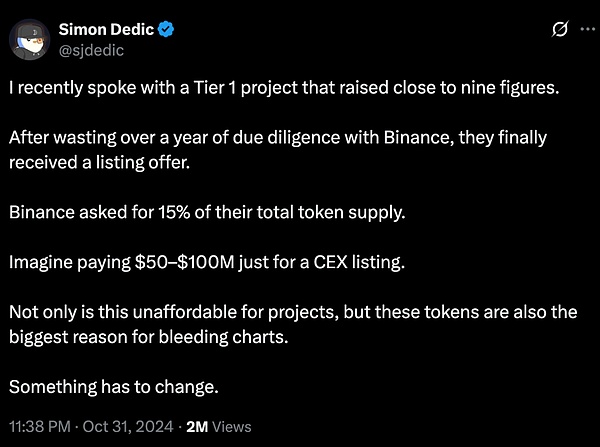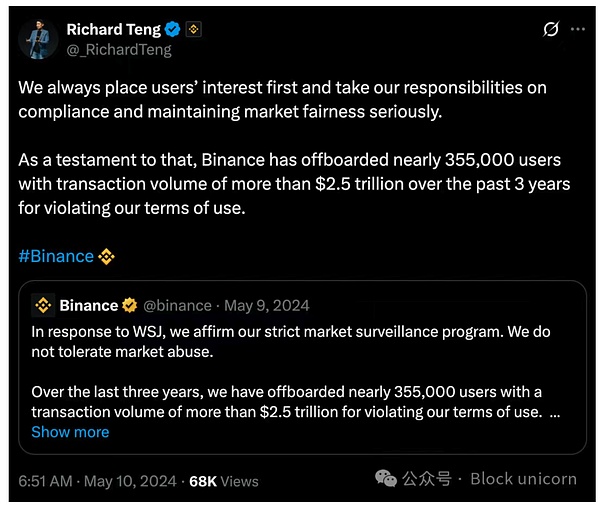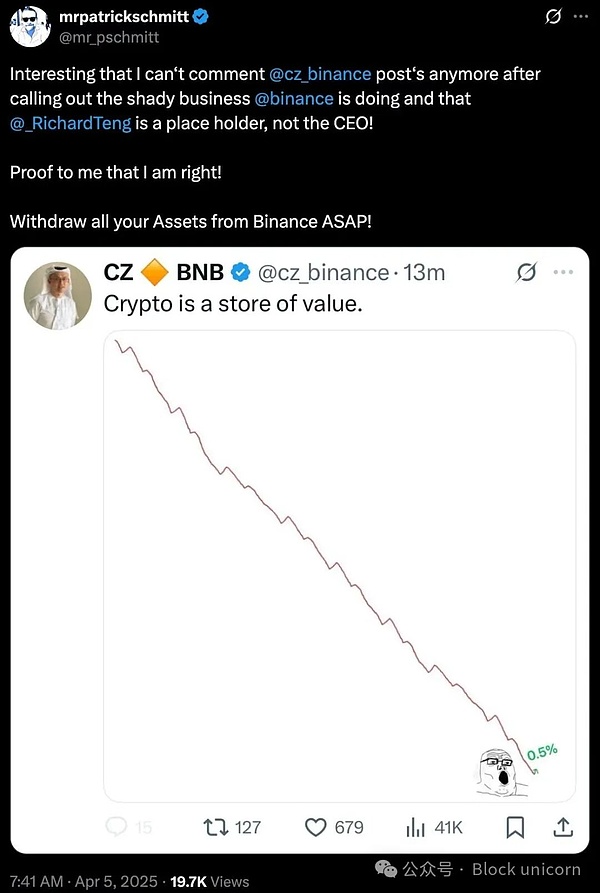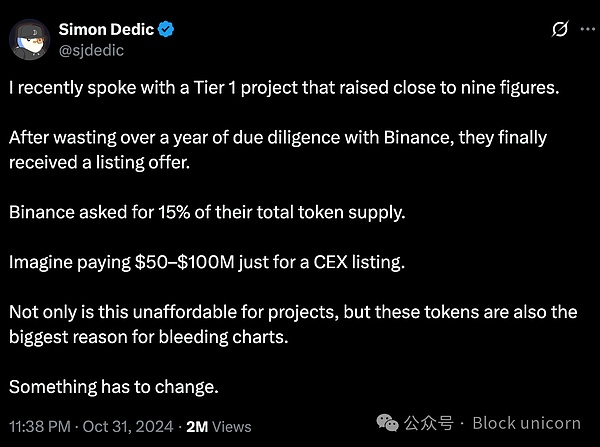Author: Thejaswini M A
Translation: Block unicorn
Preface
This notice has ignited cryptocurrency Twitter. CZ removed the description "ex-@binance" from his profile.
The prediction market is digesting the expectations of a presidential pardon. My X timeline is filled with various speculations about the founder's imminent return. Everyone has different opinions on whether Zhao Changpeng can reclaim his throne at the world's largest cryptocurrency exchange.
However, while the internet is obsessed with Zhao Changpeng's digital footprint, one person has quietly taken the reins at Binance, guiding the company through its most perilous times in history.
We noticed. Now it’s time to tell his story.
Richard Teng
Richard Teng has quietly transformed Binance from a compliance nightmare into one of the most regulated cryptocurrency exchanges. He took over during the company's darkest hour, facing a $4.3 billion fine, regulatory fury, and existential questions about the company's survival.
Eighteen months later, Binance has more users, licenses, and institutional partners than ever before.
The 52-year-old former regulator insists he is focused on the future, not the past. But his situation is more precarious than it appears. The choices he made to legitimize Binance may have come at the cost of its original revolutionary spirit.
Richard Teng's cryptocurrency journey began in the most traditional of places: the Singapore government office. After graduating with a first-class honors degree in accounting from Nanyang Technological University in 1994, he spent 13 years as a regulator at the Monetary Authority of Singapore (MAS).
Teng came from humble beginnings. His mother worked in a nursing home, and details about his father are scarce in public records. Government work provided him with a sense of security and prestige that his family background could not.
At MAS, Teng learned the mechanisms of financial regulation. He helped shape Singapore's transformation into a global financial hub, establishing the rules that banks must follow. He investigated companies that violated those rules. Teng believes that smart regulations can foster innovation rather than stifle it.
In 2015, his major breakthrough came when he moved to Abu Dhabi to head the Financial Services Regulatory Authority of Abu Dhabi Global Market (ADGM). In 2017, he encountered cryptocurrency there and made a decision that would define his career. He did not ban digital assets but sought to regulate them appropriately.
ADGM became one of the first financial centers to establish comprehensive cryptocurrency regulations. This framework attracted dozens of cryptocurrency companies and established Teng's reputation as an advanced regulator. But it also marked his transition from rule-maker to rule-breaker. By 2021, Teng crossed the line and joined Binance as CEO of its Singapore operations.
This was a man with decades of enforcement experience in financial regulation, now working for an exchange that seemed to completely disregard the rules.
When CZ appointed Teng to lead Binance Singapore in 2021, it appeared to be a strategic hire. The exchange was facing global regulatory pressure, and Teng's credentials helped ease relations with authorities. However, Teng's rise within Binance exceeded everyone's expectations. Within two years, he was promoted from head of a single-country operation to overseeing regional markets across Asia, Europe, and the Middle East. By the end of 2023, he was widely regarded as CZ's potential successor.
Nevertheless, few anticipated that the transition would be so sudden. On November 21, 2023, CZ announced his resignation as part of a plea agreement with U.S. authorities. Teng was immediately appointed CEO, taking over a company in crisis.
Binance faced the largest fine in history from the U.S. Treasury. Regulators in multiple countries were investigating or banning the exchange. Users were withdrawing funds, concerned about the platform's stability.
Teng had to act quickly.

Compliance Revolution (or Compromise?)
Teng's top priority was clear: to repair Binance's relationship with regulators.
Under CZ's leadership, the exchange operated with minimal oversight, and compliance was often sidelined. Teng completely overturned this status quo.
He hired hundreds of compliance officers, established the company's first formal board, and invested "hundreds of millions" in risk management systems. He began collaborating with regulators rather than fighting against them.
The results were impressive. Binance now holds regulatory licenses in 21 jurisdictions, more than any other cryptocurrency exchange. Major institutions that once avoided the platform are now eager to collaborate.
However, critics argue that Teng has overcorrected. They claim that in his eagerness to appease regulators, he has stripped Binance of much of its innovation and competitiveness.

The exchange now takes months to list new tokens, whereas during the CZ era, launches were rapid. The compliance process is so stringent that some projects choose to launch on other platforms. Once nimble startups that broke the mold are now slow-moving and rule-bound.
Teng rebuffed this characterization, arguing that compliance is a necessary condition for mainstream adoption.
His exact words were:
"We paid a heavy price for this, and we hope that other participants in this space can learn from our lessons," … "The entire industry can work better together to keep bad actors out."
Perhaps Teng's biggest challenge is not regulatory pressure or user complaints, but the shadow of his predecessor. CZ remains Binance's largest shareholder, and if his legal issues are resolved, he could theoretically return to an operational role.
This creates an awkward dynamic. Teng is technically the CEO, but everyone knows he is employed by someone who is no longer formally involved in the company's affairs. Major strategic decisions still require CZ's approval, even if those decisions shouldn't be his to make.

By early 2025, the situation became more complicated when CZ removed the description "former Binance CEO" from his social media profile. Teng insisted he was not worried about being replaced. But his position is inherently unstable. If CZ does return, what role will the person who kept Binance running during his absence play?

Despite various conspiracies within the company, Teng has established his position as CEO. His signature issue is financial inclusion—using cryptocurrency to serve billions of people who are excluded by traditional banks.
He often mentions that remittances are the "killer application" of cryptocurrency. Traditional cross-border remittance services can charge fees of 10% or more. With cryptocurrency, these transfers can be completed almost instantly and at very low costs.
Teng explains, "In the past few years, especially in many countries experiencing high inflation, their situation has been much better by holding stablecoins."
As of mid-2025, Binance's payment service, Binance Pay, has processed over $230 billion in transactions, covering more than 300 million transactions. Teng estimates that this has saved users over $1.75 billion compared to traditional remittance services.
Compared to the CZ era, the focus on practicality rather than speculative trading represents a shift. His predecessor catered to day traders and yield farmers, while Teng targets the global poor and unbanked populations. This is a noble mission, but it raises questions about priorities. Should the world's largest cryptocurrency exchange focus on serving the complex traders who generate most of its revenue, or provide basic financial services to those who may never trade?
Teng's biggest bet is on institutional investor adoption. Under his leadership, Binance actively seeks support from hedge funds, family offices, and traditional financial institutions.
But this institutional investment model also comes with its pros and cons. Professional investors expect the same level of service and protection as traditional financial institutions. They want independent custody, insurance coverage, and regulatory compliance. All of these services come at a high cost and are very complex.
Teng believes that institutional adoption will benefit everyone by bringing legitimacy and stability to the crypto market. But whether this trade-off is worth it remains to be seen.
Operating the world's largest cryptocurrency exchange means becoming the biggest target for hackers. In January 2025, competitor Bybit lost $1.5 billion due to experienced attackers, which served as a reminder of the risks faced by cryptocurrency platforms.
Teng has made security a cornerstone of his leadership, investing "hundreds of millions" in defense systems. Binance maintains a $1 billion insurance fund and regularly publishes "proof of reserves" reports.
However, some security experts question whether these measures are sufficient. While the insurance fund is substantial, it only covers a small portion of Binance users' deposits. The proof of reserves reports, while transparent, do not prevent internal crimes or sophisticated attacks.
Meme Coin Dilemma
Teng has struggled to find a balance in token listings. Binance's decisions on which tokens to support can cause some projects to skyrocket in value overnight, putting immense pressure on the exchange.
The situation worsened with the explosive growth of meme coins and speculative tokens. Millions of new tokens are launched every month, most of which have no real use or long-term prospects. Users want to tap into the latest trends, while regulators want to protect consumers.
Teng has tried to address this issue through community voting and stricter research. But this approach has brought new problems. The listing process has become so lengthy and expensive that even legitimate projects struggle to enter the platform.
Some industry observers point out that some well-funded large projects have spent over a year in Binance's due diligence process, only to receive listing invitations that require them to forfeit a significant portion of their token supply. These equity-like demands, just to enter the exchange, can cost projects tens of millions of dollars.

But Teng's team believes that strict requirements are necessary measures to protect users from projects that may disappear after dumping their tokens. This tension reflects a deeper challenge: how to provide reasonable market access for legitimate projects while protecting retail investors from fraud?
The Road Ahead (and the Shadows Behind)
As Teng approaches his second year as CEO, his track record is mixed. He has undoubtedly stabilized Binance and restored relations with regulators. User growth continues, and the exchange maintains its market dominance.
The crypto industry values bold leadership and risk-taking, while regulatory compliance often stifles these qualities. Teng's cautious approach may be effective for now, but it may not be sustainable in a rapidly changing industry.
The CZ factor adds another layer of uncertainty. If the founder does return, will Teng continue in a subordinate role? Will he be completely sidelined? Or will he finally have the chance to build his own legacy without the shadow of others?
Teng faces a critical question about Binance's identity. Is it a crypto-native platform that just happens to follow regulations, or is it a traditional financial institution that just happens to trade digital assets?
His answer to this question will not only determine his own fate but also the future of the world's most important cryptocurrency exchange.
This is the story of Richard Teng. See you in the next article.
免责声明:本文章仅代表作者个人观点,不代表本平台的立场和观点。本文章仅供信息分享,不构成对任何人的任何投资建议。用户与作者之间的任何争议,与本平台无关。如网页中刊载的文章或图片涉及侵权,请提供相关的权利证明和身份证明发送邮件到support@aicoin.com,本平台相关工作人员将会进行核查。



